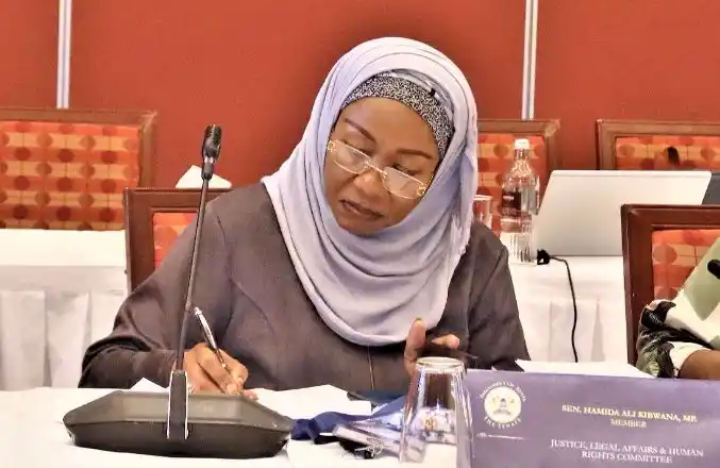Amerix, a well-known Kenyan blogger, has built a reputation for exposing corrupt and scandalous individuals in both public service and the private sector.
His latest target is Hamida, a nominated senator from the coastal region of Kenya.
Hamida has been frequently seen at the IMF Headquarters, promoting a controversial bill that has sparked outrage among local communities.
The bill in question is the IMF-funded Nuts and Oil Crops Development Bill, 2023.
This proposed legislation aims to criminalize the growth and sale of nuts and oils by rural farmers unless they have the explicit approval of the County Government.
Any farmer found planting or selling these crops without permission would face penalties, a move that has been widely criticized as detrimental to the livelihoods of many.
Hamida claims to be a part of the economic liberation struggle, but Amerix argues that she is in the pockets of the IMF, persecuting rural farmers in the coastal region.
The Coast, a wealthy region with massive economic potential, relies heavily on agriculture, mining, and transportation.
Key agricultural products include coconut, cashew nuts, macadamia, palm, sesame, and bambara nuts.
On top of that, the region is rich in minerals such as titanium, gold, niobium, cobalt, and iron, and has vital transportation hubs like ports and railways.
However, Amerix asserts that the World Bank and corrupt local governors perpetuate the false narrative that tourism is the region’s primary economic pillar.
This, he claims, is a strategy to loot minerals under the guise of promoting tourism.
According to Amerix, politicians like Hamida, in cahoots with international financial institutions, prefer coastal residents to remain impoverished so they can exploit them.
He alleges that these residents are reduced to being sex slaves, beach boys, and traditional dancers for tourists who are more interested in mining the region’s resources than enjoying its attractions.
The poverty in the coastal region, according to Amerix, is politically manufactured.
This allows foreign interests, backed by corrupt local politicians, to continue looting minerals and grabbing land.
In return, locals are given token gestures like useless bursaries, painted buildings, vaccine workshops, and bribes for village vigilantes.
To keep the population subdued, the establishment allegedly floods the area with cocaine and other drugs, numbing the collective intelligence of the youth.
When the youth protest this injustice, politicians respond with violence, sending hooligans and vigilantes to terrorize those who dare to speak out.
This has been particularly evident in regions like Kwale, Kilifi, and Taita, where the youth have begun to realize that their poverty is an artificially created illusion meant to benefit corrupt politicians and foreign companies.
Amerix has therefore called on the youth of the coastal region to wake up from their self-induced slumber and resist this exploitation.
He warns that if they do not take action, they will have no future in their own land, as their resources continue to be plundered by those in power.
In his relentless pursuit of truth and justice, Amerix sheds light on the systemic corruption and hypocrisy that plague the coastal region.
His exposé of Hamida and the IMF-backed bill serves as a clarion call for the youth to rise up and reclaim their rights, their land, and their future.





















Add Comment